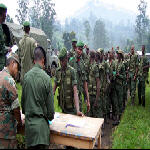 The Democratic Republic of Congo's army has launched an attack against rebel leader Laurent Nkunda, using helicopter gunships and heavy artillery.
The Democratic Republic of Congo's army has launched an attack against rebel leader Laurent Nkunda, using helicopter gunships and heavy artillery.
A BBC correspondent in the east of DR Congo says it is the start of a long-anticipated offensive.
UN peacekeepers say government forces are attempting to take Mushake, a rebel stronghold 40km north-west of Goma, a day after they lost a battle.
Gen Nkunda's men took a nearby town, forcing its 40,000 residents to flee.
Government forces have repeatedly threatened Gen Nkunda with force unless he relinquishes his control over areas close to the Rwandan border.
But he claims he is defending his own Tutsi community against Rwandan Hutu rebels responsible for the Rwandan genocide in 1994, who have been roaming the east of DR Congo ever since.
Strategic
The BBC's Arnaud Zajtman in the region says Mushake looks over a key road that links the regional capital, Goma, with valuable tin mines and rich farming land further west.
The small hilly town is a stronghold of the rebels and its buzzing market centre is inhabited mainly by Tutsi cattle farmers.
It is being attacked by ground troops using heavy artillery supported by two attack helicopters of the government forces.
A military spokesman for the UN mission in DR Congo said UN peacekeepers are bringing logistic support to the government forces, but are not engaged in any fighting.
The attack comes a day after the rebels captured the town of Nyanzale, about 100km further north.
The rebels forced the government soldiers to pull out and took control of their military base there.
Witnesses said over 40,000 civilians fled as a result.
There were no reports of civilian casualties but medical sources told the AFP news agency that several wounded government soldiers were in nearby hospitals.
The elected Congolese government has made a commitment to flush out the Rwandan Hutu rebels, and says Mr Nkunda and his 6,000-8,000 men should also lay down their arms.
Some 15,000 UN peacekeepers are in DR Congo to secure peace after a five-year conflict officially ended in 2002.
Related articles
- • UN Security Council Calls on Rwanda to Stop Supporting M23 Rebels in DR Congo (February 22, 2025)
- • 'Deadly environment' plus 'political and social' obstacles hinder Ebola fight, Security Council hears (July 24, 2019)
- • Ebola outbreak declared an international Public Health Emergency (July 17, 2019)
- • At least 30 dead after massacres in Ituri (March 2, 2018)
- • ICC Confirms 14-Year Sentence Against Thomas Lubanga (December 1, 2014)
- • ICC sentences Germain Katanga to 12 years (May 23, 2014)
- • ICC finds Germain Katanga guilty of war crimes and crime against humanity (March 7, 2014)
- • Bosco Ntaganda Attacked Civilians on Ethnic Grounds, ICC Prosecutor Says (February 10, 2014)
- • DR Congo Asks Rwanda to Turn Over M23 Rebel Leaders (July 26, 2013)
- • Rebel Leader Bosco Ntaganda Makes First Appearence Before the ICC (March 26, 2013)
- • Bosco Ntaganda in the International Criminal Court's custody (March 22, 2013)
- • International Criminal Court Acquits Mathieu Ngudjolo Chui (December 18, 2012)
- • DR Congo, Rwanda Sign Pact to Fight Rebels in Eastern Congo (July 15, 2012)
- • Kagame Is A Problem for The U.S. and The U.K. (June 23, 2012)
- • ICC Prosecutor Seeks 30 Years for Thomas Lubanga (June 13, 2012)
- • UN Report Accuses Rwanda of Supporting Bosco Ntaganda Rebels (May 28, 2012)
- • ICC Prosecutor Seeks New Charges Against Ntaganda, FDLR Leader (May 14, 2012)
- • Kabila's Position on The Arrest of Ntaganda 'Has Not Changed' (April 13, 2012)
- • Kabila, Army Chief of Staff head to eastern Congo to deal with defectors (April 10, 2012)
- • DR Congo Government Warns Bosco Ntaganda He May Face Justice (April 6, 2012)
- • Thomas Lubanga found guilty of using child soldiers (March 14, 2012)
- • Kabila Confident He Will Win Re-Election (October 18, 2011)
- • Militiamen Sent to Testify in Warlords Trials at ICC (March 28, 2011)
- • UN Report: CNDP, Congolese Soldiers Involved in Illegal Mining Operations (November 30, 2010)
- • Thomas Lubanga trial to resume at ICC (October 8, 2010)
- • ICC suspends release of Thomas Lubanga (July 23, 2010)
- • ICC orders the release of Thomas Lubanga (July 15, 2010)
- • ICC suspends Thomas Lubanga trial (July 8, 2010)
- • Lubanga Witness Says He Was Paid US$200 To Tell Lies (February 8, 2010)
- • DR Congo says ex-rebel chief Nkunda to be extradited from Rwanda in 2010 (January 18, 2010)







